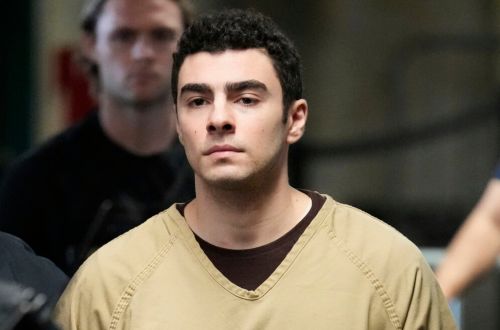

The trial of Luigi Mangione has become more than a criminal proceeding; it is a reflection of the tensions running through American society.

By Matthew A. McIntosh
Public Historian
Brewminate
Introduction
The killing of UnitedHealthcare CEO Brian Thompson unfolded on December 4, 2024, when he was fatally shot outside a Midtown Manhattan hotel. Investigators soon identified Luigi Mangione as a suspect, and he was arrested five days later in rural Pennsylvania before being extradited to New York to face charges.
In state court, Mangione was initially charged with second-degree murder, criminal possession of a weapon, and counts labeling the shooting as an act of terrorism. Those terrorism charges were later dismissed in September 2025 by a New York judge, who ruled that prosecutors had overreached in categorizing the killing as an attempt to intimidate government or civilian populations. The core murder charge, however, remains in place, and the federal government has taken the lead in prosecuting the case. Mangione has pleaded not guilty.
At the federal level, prosecutors filed their own murder indictment and announced their intent to seek the death penalty. That decision has been challenged by the defense, which argues that political pressure from the Trump administration has shaped the case. Attorneys for Mangione maintain that the government is framing the defendant as a political actor rather than treating the case strictly as a criminal matter. Mangione, for his part, has consistently pleaded not guilty in both state and federal proceedings.
New Filings and Alleged Motive
Court filings have shed new light on what prosecutors describe as Mangione’s alleged motive. When he was arrested, investigators recovered a red notebook containing handwritten diary entries. According to reporting from CNN, the entries revealed intense frustrations with the health insurance industry, accusations of corporate greed, and reflections on the impact of America’s health care system on ordinary people.
Prosecutors argue that the writings demonstrate premeditation and an ideological bent, suggesting Mangione viewed violence as a way to strike back at what he saw as systemic abuses. The entries, they claim, amount to a personal manifesto that connects directly to the fatal shooting.
The defense has sharply contested this interpretation. Lawyers for Mangione insist the diary entries are private reflections, not evidence of a criminal plan. They argue that prosecutors are stretching the meaning of ambiguous writings to construct a political motive that fits a broader narrative. The defense further warns that allowing such documents to define the case risks convicting a man based on his thoughts rather than proven actions.
The diary revelations have nevertheless amplified public debate. Critics of the U.S. health-care system have seized on the filings as symbolic of broader anger over costs and access to care, while opponents condemn any attempt to portray the alleged act as a form of protest. For now, the writings remain central to the government’s case, and to the battle over how Mangione’s actions should be understood in court.
Concerns Over Fair Trial and DOJ Commentary
As prosecutors move forward, the trial itself has come under scrutiny for how it is being handled publicly. U.S. District Judge Margaret Garnett has warned that Justice Department officials may have already undermined Mangione’s right to a fair trial. In a September order, she said statements made by federal officials about the case “likely broke court rules” by portraying Mangione in ways that could prejudice potential jurors.
According to filings, DOJ spokespersons and even some social media posts connected to the department suggested political motives and emphasized guilt before any conviction. These comments, amplified in the press, echo rhetoric from the Trump administration that has sought to frame the killing as a politically charged act. Judge Garnett cautioned that such commentary creates “a serious risk” of tainting the jury pool, adding that federal prosecutors must instruct officials to stop making public statements about the case.
The defense has seized on the issue, arguing that the government’s conduct has already compromised Mangione’s ability to face an impartial jury. They claim that the pretrial narrative, shaped by DOJ commentary and official remarks, risks turning the courtroom into an arena for political theater rather than a venue for fair adjudication.
The government, for its part, has argued that its statements were intended to keep the public informed in a case of high national interest. But Judge Garnett’s rebuke signals that she views the line between transparency and prejudicial commentary as having been crossed. If the violations persist, the court could impose sanctions or even consider extraordinary remedies, including a change of venue.
Reaction and Public Sentiment
The revelations about Mangione’s writings and the judge’s rebuke of the Justice Department have intensified public debate around the case. Some critics of the American health-care system see Mangione’s alleged grievances as a reflection of real anger over rising costs, coverage denials, and corporate profits. On social media and in activist circles, a minority have even framed him as a misguided symbol of resistance, though most stop short of condoning violence. Others argue that any attempt to contextualize the killing risks excusing what prosecutors say was a deliberate act of murder.
For Mangione’s defense team, public sentiment has become a double-edged sword. On one hand, widespread frustration with the health-care industry could make some jurors sympathetic to his alleged mindset. On the other, the intense media attention, amplified by DOJ opinionating, has created a climate where it may be nearly impossible to seat an impartial jury. Defense attorneys maintain that their client should be judged only on admissible evidence presented in court, not on the swirl of political commentary around the case.
Prosecutors, meanwhile, have continued to emphasize that Thompson’s death was a criminal act, not a policy statement. They argue that framing the case in ideological terms risks undermining the seriousness of the crime and could embolden others to lash out against institutions through violence. By keeping the alleged motive front and center, they aim to reinforce the idea that this was not simply an isolated killing but an attack with broader symbolic undertones.
Beyond the courtroom, the case has struck a nerve in the national conversation about health care. For many, it underscores the gulf between frustration over insurance and access, and the extreme, and, for prosecutors, criminal actions that sometimes erupt from it. The trial will not only decide Mangione’s fate but may also shape how Americans talk about dissent, protest, and the boundaries of political anger in an era of deep institutional distrust.
Legal Hurdles and Possible Outcomes
The court now faces a series of difficult questions that could shape the trajectory of the trial. One immediate issue is whether Judge Garnett will grant the defense’s request for additional protection, including a possible change of venue or stricter limits on government commentary. Moving the trial outside New York City, where media coverage has been intense, could help reduce pretrial prejudice, but it would also risk delays and logistical complications.
The defense is also expected to challenge the admissibility of Mangione’s diary entries. Lawyers argue the writings are too ambiguous and prejudicial to be fairly weighed by a jury. If the judge agrees, large portions of the prosecution’s alleged motive evidence could be excluded. That fight will likely be central in pretrial hearings, as prosecutors have staked much of their case on connecting Mangione’s thoughts to his actions.
Another looming battle concerns the federal government’s intent to pursue the death penalty. Prosecutors formally notified the court of their decision in April, giving the defense until this summer to file motions opposing it. Defense attorneys are expected to argue that the decision is politically motivated and out of step with broader trends, as federal executions have been rare in recent decades. Judge Garnett will ultimately decide whether the government has met its burden to proceed with capital punishment.
If the case goes to trial as scheduled, jurors will be tasked with navigating an extraordinary blend of legal, political, and cultural issues. The verdict could hinge not only on the evidence itself but on how successfully the court manages the balance between public interest, fair trial rights, and the inflamed national debate over health care. Appeals, no matter the outcome, are almost certain, meaning the case could remain in the courts for years.
Conclusion and Significance
The trial of Luigi Mangione has become more than a criminal proceeding; it is a reflection of the tensions running through American society. On one side lies the brutal killing of a health-care executive, which prosecutors insist was deliberate and calculated. On the other lies the question of whether political pressure, prosecutorial overreach, and public anger have already compromised the fairness of the process.
Mangione remains presumed innocent, and his plea of not guilty ensures that the evidence will be tested in court. Yet the case highlights how easily criminal trials can be swept up into the country’s larger political storms. The alleged motive tied to health-care frustrations, the Justice Department’s public commentary, and the specter of the death penalty all combine to make this an extraordinary legal fight.
Whatever the verdict, the proceedings will serve as a measure of how the justice system handles high-profile cases in an era of deep public distrust. For a nation still wrestling with health-care inequities and political polarization, the Mangione case is less about a single defendant and more about the uneasy boundaries between dissent, violence, and the rule of law.
Originally published by Brewminate, 09.30.2025, under the terms of a Creative Commons Attribution-NonCommercial-NoDerivatives 4.0 International license.


